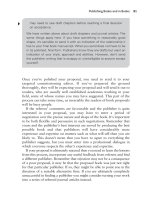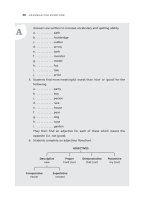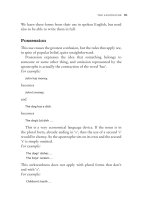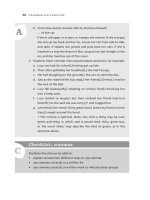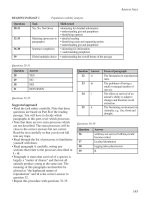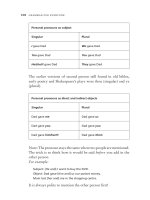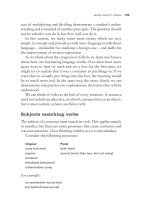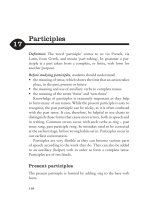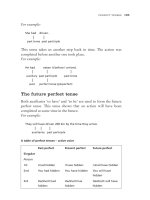Grammar for everyone part 11
Bạn đang xem bản rút gọn của tài liệu. Xem và tải ngay bản đầy đủ của tài liệu tại đây (129.22 KB, 7 trang )
A
Answers are written to increase vocabulary and spelling ability.
a. . . . . . . . . . . path
b. . . . . . . . . . . footbridge
c. . . . . . . . . . . soldier
d. . . . . . . . . . . arrow
e. . . . . . . . . . . tank
f. . . . . . . . . . . monster
g. . . . . . . . . . . model
h. . . . . . . . . . . fox
i. . . . . . . . . . . tale
j. . . . . . . . . . . artist
5. Students find more meaningful words than ‘nice’ or ‘good’ for the
following.
a. . . . . . . . . . . party
b. . . . . . . . . . . boy
c. . . . . . . . . . . person
d. . . . . . . . . . . race
e. . . . . . . . . . . house
f. . . . . . . . . . . pear
g. . . . . . . . . . . dog
h. . . . . . . . . . . tune
i. . . . . . . . . . . garden
They then find an adjective for each of these which means the
opposite (i.e. not good).
6. Students complete an adjectives flowchart.
ADJECTIVES
Descriptive
new
Proper
Ford (car)
Demonstrative
that (car)
Possessive
my (car)
Comparative
newer
Superlative
newest
60
G r A M M A r f o r e V e rY o n e
C
Checklist: adjectives
The student should now be able to:
• give the meaning of the word adjective
• define the word adjective – what is an adjective?
• give examples of adjectives
• qualify given nouns with appropriate adjectives
• pick out adjectives from written material
• apply adjectives to nouns to make a sentence more meaningful
• explain the function of adjectives
61
A d j e c t i V e s
Adverbs
The way it’s done!
Definition: Remembering that the word ‘verb’ is derived from
Latin verbum meaning ‘word’ we see that adverb must mean some-
thing added to a word.
Before learning about adverbs, students should:
• understand the term ‘verb’
• be able to describe the function of a verb – What is a verb?
• be able to form simple sentences using a noun or pronoun
together with a verb
An adverb is a word that adds meaning to any other word,
except a noun or pronoun (that being the job of an adjective).
Adverbs are best understood as being of two kinds, those that
add to the meaning of a verb and those that add to the meaning of
other parts of speech and other adverbs.
The English language includes an immense range of adverbs,
and while flowery writing can result from an over-lavish use of
either adjectives and adverbs, they do enable us to be wonderfully
imaginative and subtly descriptive. Henry James remarked in one
of his letters, ‘I’m glad you like adverbs – I adore them; they are
the only qualifications I really much respect.’
3
Adverbs are best taught first, as their function is readily under-
stood by young children. In order to establish a clear distinction
between the functions of adverbs and adjectives it is preferable
to use a term other than ‘qualify’ for adverbs. The term ‘limit’
3 Crystal, David & Crystal, Hilary 2000, Words on words: Quotations about
language and languages, Penguin Books, Middlesex, UK.
5
62
can confuse young students by implying diminished meaning,
although that, of course, it does in fact do. For instance, if you
attribute one quality to a verb such as ‘He ran quickly’, you have
denied it an opposing or conflicting quality – he did not run slowly.
However, to avoid any confusion for learners we have chosen the
term ‘modify’ for the function of adverbs.
While acknowledging that students may come up against kinds
of adverbs not mentioned here, the following are those commonly
used and easy to comprehend. Adverbs add meaning in a number
of different ways.
Adverbs of time (‘when’ adverbs)
These adverbs tell us when the action of the verb does or does not
occur.
For example:
tomorrow, never
The show is on tomorrow. I have never been to the show.
Adverbs of place (‘where’ adverbs)
These tell us where the action of the verb does or does not
happen.
For example:
here, somewhere
It isn’t here. It must be somewhere!
Adverbs of manner (‘how’ adverbs)
These tell us the way in which the action of the verb does or does
not happen.
For example:
well, rudely
You speak well. That boy spoke rudely.
63
A d V e r b s
Interrogative adverbs (‘question’ adverbs)
These adverbs are the question words that apply to the verb in a
sentence.
For example:
how, why, where
How did he escape?
Why did you leave the gate open?
Where can he be?
Comparative adverbs (‘comparing’ adverbs)
Adverbs of comparison follow a similar pattern to comparative
adjectives while maintaining their function of modifying words.
For example:
fast, faster [comparing two], fastest [comparing more than two]
The cake disappeared fast.
Your buns went faster.
But the pizza went fastest!
In the case of longer adverbs we use more and most – again to
avoid clumsiness.
What a colourful tie. This one’s more colourful.
But that one is most colourful.
Irregular adverbs of comparison
These irregular forms cause difficulty for some students who use
them wrongly and use an adjective instead (He did it good – or
performed real bad).
It is a good idea to teach these and establish them in the minds
of students early. Use a display, which can be made by the students
themselves.
64
G r A M M A r f o r e V e rY o n e
